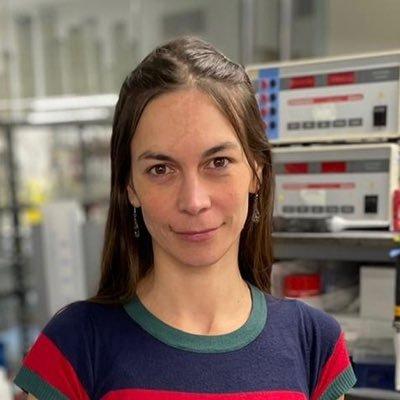Research Focus
Our research aims to understand the epigenetic regulation of transposable elements and how their dysregulation contributes to the generation and development of cancer. In particular, we investigate their roles as gene regulators and triggers of anti-tumour immunity in blood cancers.
Key Publications
Endogenous retroviruses are a source of enhancers with oncogenic potential in acute myeloid leukaemia. Nature Communications (2020) 11(1):3506. PMID: 32665538
TET2 regulates the neuroinflammatory response in microglia. Cell Reports (2019) 29(3):697-713. PMID: 31618637
SETDB1 prevents TET2-dependent activation of IAP retroelements in naive embryonic stem cells. Genome Biology (2018) 19(1):6. PMID: 29351814
Fuzziness and noise in nucleosomal architecture. Nucleic Acids Res (2014) 42(8):4934-46. PMID: 24586063
Major Funding
- 2022-2028 - Cancer Research UK Career Development Fellowship, 'The Roles of Transposable Elements as Oncogenic Regulators in Acute Myeloid Leukaemia,' £1,456,127
- 2023-2025 - European Hematology Association Advanced Research Grant, 'Functional Interrogation of Transposable Elements in Paediatric Acute Myeloid Leukaemia,' €160,000
- 2021-2023 - EASI-Genomics Project Grant: '3D-TE: The Contribution of Transposable Elements to Chromatin Organization in Acute Myeloid Leukaemia,' equivalent of £80,000
Other Activities
- Core member of QMUL Epigenetics Hub
- Member of LMS Imperial TE Hub
Research
Our research aims to understand the epigenetic regulation of transposable elements and how their dysregulation contributes to the generation and development of blood cancers. In particular, we investigate their roles as gene regulators and triggers of anti-tumour immunity in blood cancers. Our long-term vision is to address how we can utilise transposable elements as a gateway to develop new and effective treatments for cancer.
Transposable elements (TEs) are mobile DNA segments that have expanded within the human genome throughout evolution. TEs have evolved cis-regulatory sequences to exploit the host cellular machinery to promote their own transcription and replication. Whilst the vast majority of TEs in the human genome have been rendered immobile due to mutation, many have retained their regulatory function. Given their selfish nature, TEs have dispersed vast amounts of cis-regulatory sequences and transcriptional units across the genome, providing an abundant source of transcriptional modulatory elements.
Epigenetic dysregulations are hallmarks of cancer and that provides a particularly fertile ground for TE activation. In fact, we revealed the first examples of TEs activated as oncogenic enhancers in acute myeloid leukaemia (AML), which conferred a proliferative advantage to the cells (Deniz et al, Nat. Comms., 2020). In contrast, genome-wide epigenetic changes in cancer cells could also potentially activate TEs that regulate the expression of tumour suppressor genes, leading to loss of cancer cell fitness; or trigger anti-tumour immune responses leading to the destruction of cancer cells via “viral mimicry”.
Using AML as a model system, the overarching goal of the Deniz Lab is to comprehensively delineate the molecular and cellular functions of TEs in the cancer genome and characterise the epigenetic mechanisms that define their diverse activities. To achieve this aim, we will:
- Identify TE-derived cis-regulatory DNA elements and determine their transcriptional effects in AML
- Assess how these regulatory TEs modulate cancer cellular phenotypes
- Dissect the role of TE-mediated immune response in AML
- Identify driver epigenetic events in TE regulation
For more information please visit our website.
Other Activities
- Core member of QMUL Epigenetics Hub
- Member of LMS Imperial TE Hub
Major Funding
- 2022-2028 - Cancer Research UK Career Development Fellowship, 'The Roles of Transposable Elements as Oncogenic Regulators in Acute Myeloid Leukaemia,' £1,456,127
- 2023-2025 - European Hematology Association Advanced Research Grant, 'Functional Interrogation of Transposable Elements in Paediatric Acute Myeloid Leukaemia,' €160,000
- 2021-2023 - EASI-Genomics Project Grant: '3D-TE: The Contribution of Transposable Elements to Chromatin Organization in Acute Myeloid Leukaemia,' equivalent of £80,000
Biography
I received my undergraduate degree in Molecular Biology and Genetics from Middle East Technical University (Ankara, Turkey) and MSc degree in Molecular and Cellular Biology from Ruprecht Karls University (Heidelberg, Germany). I completed my PhD in 2014 with Professor Modesto Orozco from Barcelona University, where my research focused on nucleosome positioning in yeast. I revealed genome-wide chromatin dynamics during yeast cell cycle and uncovered its functional implications in gene regulation and DNA replication.
I then joined Dr Miguel Branco’s group at Queen Mary University of London for my postdoctoral training to investigate the epigenetic regulation of transposons in early development and cancer. I uncovered the novel roles of two key enzymes in the epigenetic pathway (TET2 and SETDB1) that regulate transposons in mammalian development. I also demonstrated the first examples of transposons that can act as oncogenic enhancers in leukaemia, contributing to cancer cellular phenotype.
In 2021, I joined Imperial College London as a Research Fellow to establish my own research programme, funded by Imperial and AstraZeneca. In 2022, I was awarded a Cancer Research UK Career Development Fellowship and joined the Centre for Haemato-Oncology at Barts Cancer Institute, Queen Mary University of London.

